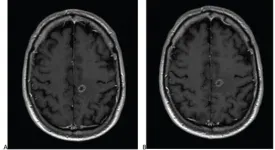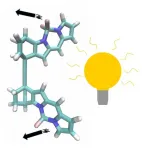(Press-News.org) SAN ANTONIO (June 17, 2021) -- Convalescent plasma therapy was associated with better survival in blood cancer patients hospitalized with COVID-19, especially in sicker patients. The findings by the COVID-19 and Cancer Consortium (CCC19) are newly published in the peer-reviewed journal JAMA Oncology.
The Mays Cancer Center, home to UT Health San Antonio MD Anderson, is part of the CCC19. The international consortium is composed of 124 medical centers and institutions in North and South America that conduct research to learn how COVID-19 affects cancer patients.
Dimpy Shah, MD, PhD, is an epidemiologist and assistant professor of population health sciences at The University of Texas Health Science Center at San Antonio, and a member of its Mays Cancer Center. She serves on the CCC19 steering committee, leads the consortium's Epidemiology Core Committee and is a co-senior author on the study.
"Early case reports suggested that cancer patients with COVID-19 benefitted from convalescent plasma, but this is the first analysis that associated convalescent plasma with improved survival using this large, real-world data set," Dr. Shah said.
The analysis compared the 30-day death rates of hospitalized adults with both blood cancer and COVID-19 from patient data supplied by the CCC19 consortium institutions. The analysis compared treatment data from 143 patients who received convalescent plasma and 823 who did not.
"Our study showed a 48% reduced risk of death for COVID patients who had blood cancer and had received convalescent plasma compared to similar patients who did not receive this treatment," she said. "This survival benefit with convalescent plasma was even greater in patients who were admitted to the intensive care unit (60% reduced risk of death) and those who needed mechanical ventilation (68% reduced mortality)," she said.
Blood cancers are associated with defects in the immune system. They begin either in the bone marrow, where blood is made, or in cells of the immune system. These types of cancer include leukemia, lymphoma and multiple myeloma.
Plasma is the largest component of human blood. Red blood cells, white blood cells and platelets are other major blood components. Convalescent plasma is plasma donated by patients who have recovered from an infection, such as COVID 19, and has been used to treat other patients suffering from the disease. Convalescent plasma was used to treat patients during the 1916 poliomyelitis outbreak in New York and during the 1918 Spanish flu epidemic, as well as later for viral infections.
"While acknowledging the limitations of non-randomized observational data, this study provides an important signal regarding the benefits of convalescent plasma. We recommend that researchers conduct randomized clinical trials to prospectively evaluate the benefits of convalescent plasma in patients with blood cancer and severe COVID-19," added Pankil Shah, MD, PhD, MSPH, assistant professor of urology at UT Health San Antonio. As the lead data scientist, Dr. Pankil Shah performed the analysis for this CCC19 study.
Ruben Mesa, MD, FACP, executive director of the Mays Cancer Center, added, "Membership in the CCC19 is just one example of our cancer center's commitment to provide the best possible care for patients throughout South Texas. In addition to providing evidence-based treatments, we also offer our patients participation in hundreds of cancer clinical trials led nationally and at our cancer center that evaluate the newest possible treatments."
He continued: "Throughout the pandemic we have safely cared for our patients and encourage the public to continue getting cancer screenings to avoid the possible progression of undiagnosed cancer to stages where it is more difficult to treat. We are open and ready to safely provide cancer screenings, research opportunities and treatment to the people of South Texas."
INFORMATION:
Other authors on the study include corresponding author Jeremy Warner, MD, MS, FASCO, associate professor medicine at Vanderbilt University Medical Center (VUMC); lead author Michael Thompson, MD, PhD, oncologist and hematologist with Advocate Aurora Health and Advocate Aurora Research Institute; and additional lead author Jeffrey Henderson, MD, PhD, associate professor of medicine and molecular microbiology at Washington University.
The CCC19 was formed in early 2020 to rapidly collect data as part of an effort to understand the unique effects the coronavirus has on cancer patients.
For more information about CCC19, visit https://ccc19.org.
Association of Convalescent Plasma Therapy With Survival in Patients With Hematologic Cancers and COVID-19
Michael Alan Thompson, Toni K. Choueiri, Peter P. Yu, Clara Hwang, Mike J. Joyner, Jonathon W. Senefeld, Zhuoer Xie, Elizabeth V. Robilotti, Esperanza Papadopoulos, Elizabeth A. Griffiths, Daniel B. Flora, Anthony P. Gulati, Samuel M. Rubinstein, Pankil K. Shah, Vadim S. Koshkin, Elizabeth M. Wulff-Burchfield, Christopher T. Su, Dimpy P. Shah, Jeremy Lyle Warner, Sanjay Mishra, Jeffrey P. Henderson
Published: June 17, 2021, JAMA Oncology
https://jamanetwork.com/journals/jamaoncology/fullarticle/2780916
The Mays Cancer Center, home to UT Health San Antonio MD Anderson, is one of only four National Cancer Institute-designated Cancer Centers in Texas. The Mays Cancer Center provides leading-edge cancer care, propels innovative cancer research and educates the next generation of leaders to end cancer in South Texas. Visit www.UTHealthsaMDAnderson.org.
To see how we are battling COVID-19, read inspiring stories on Impact.
Forest fires have crept higher up mountains over the past few decades, scorching areas previously too wet to burn, according to researchers from McGill University. As wildfires advance uphill, a staggering 11% of all Western U.S. forests are now at risk.
"Climate change and drought conditions in the West are drying out high-elevation forests, making them particularly susceptible to blazes," says lead author Mohammad Reza Alizadeh, a PhD student at McGill University under the supervision of Professor Jan Adamowski. "This creates new dangers for mountain communities, with impacts on downstream water supplies and the plants and wildlife that call these forests home."
Climate warming has diminished 'flammability barrier'
In ...
If the genome is the recipe of life, base pairs are the individual ingredients listed. These chemical structures form DNA, and every living organism on Earth has just four. The specific arrangements of these four base pairs -- A, T, C, G -- make us who and what we are.
So it was a big surprise when Scripps Research scientists revealed in 2014 that they could introduce two new, unnatural base pairs (they called them X and Y for short) into the genetic code of living bacteria in the lab. It was like two never-seen-before ingredients tossed into the recipe, hypothetically expanding the variety of dishes a cell can whip up.
Researchers immediately saw the potential applications: With more control and selection, they ...
In a bid to find or refine laboratory research models for cancer that better compare with what happens in living people, Johns Hopkins Medicine scientists report they have developed a new computer-based technique showing that human cancer cells grown in culture dishes are the least genetically similar to their human sources.
The finding, they say, should help focus more resources on cancer research models such as genetically engineered mice and 3D balls of human tissue known as "tumoroids" to better evaluate human cancer biology and treatments, and the genetic errors ...
An algorithm designed by researchers from Carnegie Mellon University's Computational Biology Department and St. Petersburg State University in Russia could help scientists identify unknown molecules. The algorithm, called MolDiscovery, uses mass spectrometry data from molecules to predict the identity of unknown substances, telling scientists early in their research whether they have stumbled on something new or merely rediscovered something already known.
This development could save time and money in the search for new naturally occurring products that could be used in medicine.
"Scientists waste a lot of time isolating molecules that are already known, essentially rediscovering penicillin," said Hosein Mohimani, an assistant ...
Leesburg, VA, June 17, 2021--According to ARRS' American Journal of Roentgenology (AJR), a reduced dose of gadobutrol is non-inferior to 100%-standard dose of gadoterate for contrast-enhanced brain MRI.
"A 25% reduced gadobutrol dose demonstrated non-inferior efficacy versus standard dose gadoterate for contrast-enhanced brain MRI," corresponding author Jan Endrikat of Germany's University Medical School of Saarland elaborated, "warranting particular consideration in patients undergoing multiple contrast-enhanced examinations."
In this international, prospective, multicenter, open-label, crossover trial (LEADER-75), 141 patients (78 men, 63 women; mean age, 58.5 years) with known or suspected CNS pathology ...
Type 1 diabetes is a disorder in which the immune system inappropriately targets a class of cells in the pancreas known as β cells that produce the hormone insulin, which plays an important role in regulating bloodstream glucose levels and the metabolism of carbohydrates, lipids, and proteins. The loss of insulin causes a range of health problems for people with type 1 diabetes, and patients become dependent on insulin injections for their survival. Even with insulin therapy, people with type 1 diabetes have shortened lifespans and are at an elevated risk of developing myriad complications.
Previous studies have identified numerous genetic risk factors for type 1 diabetes. One notable finding is the importance of the HLA region, a part of the human ...
New technologies allow users to do things like race their real bikes against other real people in a virtual world, and a new study outlines what motivates people to use these online platforms. The findings offer insights for future iterations of these technologies - and how to market them.
At issue are "mixed-reality sports": augmented reality platforms that incorporate virtual, online elements and real-world athletic endeavors. For example, Zwift is a platform that allows users to ride their real bicycles, but transfers their efforts to a virtual space depicting real-world courses - allowing them to race against other cyclists who are not physically present.
"We ...
Medical guidelines help doctors understand the best way to treat health conditions. Surprisingly, many doctors do not adhere to them, and this is a problem, according to a new study by scientists at University of Utah Health and MDGuidelines. People with lower back pain injury miss 11 more days of work in a year when they only receive treatments for lower back pain that are not recommended by medical guidelines compared to people treated according to guidelines. The findings publish in END ...
Light-driven molecular motors have been around for over twenty years. These motors typically take microseconds to nanoseconds for one revolution. Thomas Jansen, associate professor of physics at the University of Groningen, and Master's student Atreya Majumdar have now designed an even faster molecular motor. The new design is driven by light only and can make a full turn in picoseconds, using the power of a single photon. Jansen: 'We have developed a new out-of-the-box design for a motor molecule that is much faster.' The design was published in The Journal of Physical Chemistry ...
When astronomers using NASA's Hubble Space Telescope uncovered an oddball galaxy that looked like it didn't have much dark matter, some thought the finding was hard to believe and looked for a simpler explanation.
Dark matter, after all, is the invisible glue that makes up the bulk of the universe's matter. All galaxies appear to be dominated by it; in fact, galaxies are thought to form inside immense halos of dark matter.
So, finding a galaxy lacking the invisible stuff is an extraordinary claim that challenges conventional wisdom. It would have the potential to upset theories of galaxy formation and evolution.
To bolster their original finding, first reported in 2018 ...


